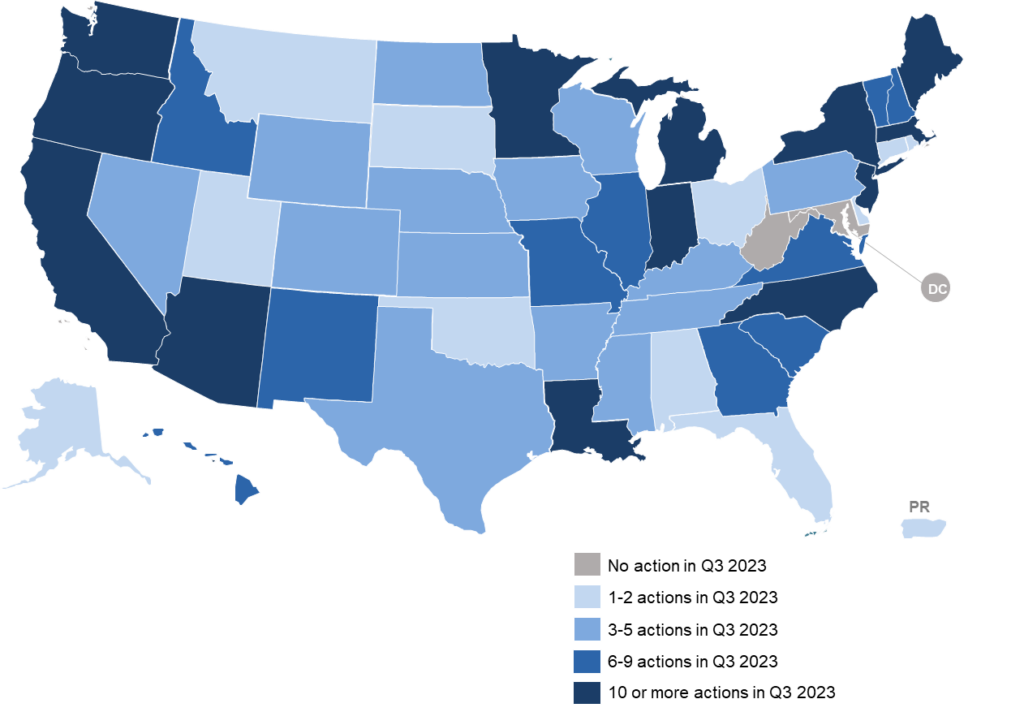50 States of Power Decarbonization Q3 2023: Utilities Consider Hydrogen and Other Emerging Resources for Power Decarbonization in Q3 2023
Raleigh, NC – (November 9, 2023) The NC Clean Energy Technology Center (NCCETC) released its Q3 2023 edition of the 50 States of Power Decarbonization. The quarterly series provides updates on state and utility actions pertaining to clean energy targets, emission reduction targets and carbon policies, generation planning and procurement rules, integrated resource plans, and electric generation capacity changes (RFPs, green tariffs, power plant retirements, etc.).
The Q3 2023 report finds that 48 states, as well as Puerto Rico, took a total of 330 actions related to electric power decarbonization and resource planning during the quarter (see figure below). Among integrated resource plans recently filed or under review by regulators in Q3 2023, planned capacity additions totaled 82,971 MW for solar, 57,557 MW for wind, 39,116 for storage, and 27,501 for natural gas, while planned coal retirements totaled 41,725 MW.
Q3 2023 Action on Power Decarbonization and Resource Planning

The report discusses three trends in power decarbonization actions taken in Q3 2023: (1) utilities planning to add hydrogen-capable generation capacity; (2) states studying and pursuing multi-sector decarbonization strategies; and (3) offshore wind procurement continuing, while some projects face challenges.
“This quarter, the majority of enacted laws focused on rules surrounding planning and procurement of generation resources,” noted Emily Apadula, Policy Analyst at NCCETC. “These practices will be particularly important as states work to meet their decarbonization goals.”
The report notes the top five policy developments of Q3 2023 were:
- Delaware lawmakers establishing a net-zero emissions target;
- Duke Energy filing its latest carbon plan in North and South Carolina;
- Michigan regulators accelerating renewable energy additions in DTE Electric’s integrated resource plan;
- The Governor of Illinois vetoing legislation lifting a moratorium on new nuclear; and
- The Maine Governor’s Energy Office kicking off its Maine Energy Plan: Pathway to 2040 effort.
“While solar and wind continue to be the dominant resources utilities plan to add over the next several years, we’re seeing a lot of attention being paid to emerging resources like hydrogen, advanced nuclear, offshore wind, and long-duration storage,” observed Autumn Proudlove, Associate Director of Policy & Markets at NCCETC. “Increasingly, utilities are including generation resources capable of using hydrogen as a fuel source within their integrated resource plans.”
View the 50 States of Decarbonization 2023 Q3 Executive Summary
View and Purchase the 50 States of Decarbonization 2023 Q3 Update FULL Report
View other 50 States Reports – Solar, Grid Modernization, Electric Vehicles and Decarbonization
ABOUT THE N.C. CLEAN ENERGY TECHNOLOGY CENTER
The N.C. Clean Energy Technology Center, as part of the College of Engineering at North Carolina State University, advances a sustainable energy economy by educating, demonstrating and providing support for clean energy technologies, practices and policies. It serves as a resource for innovative, sustainable energy technologies through technology demonstration, technical assistance, outreach and training. For more information about the Center, visit: http://www.nccleantech.
Media Contact: Shannon Helm, shannon_helm@ncsu.edu